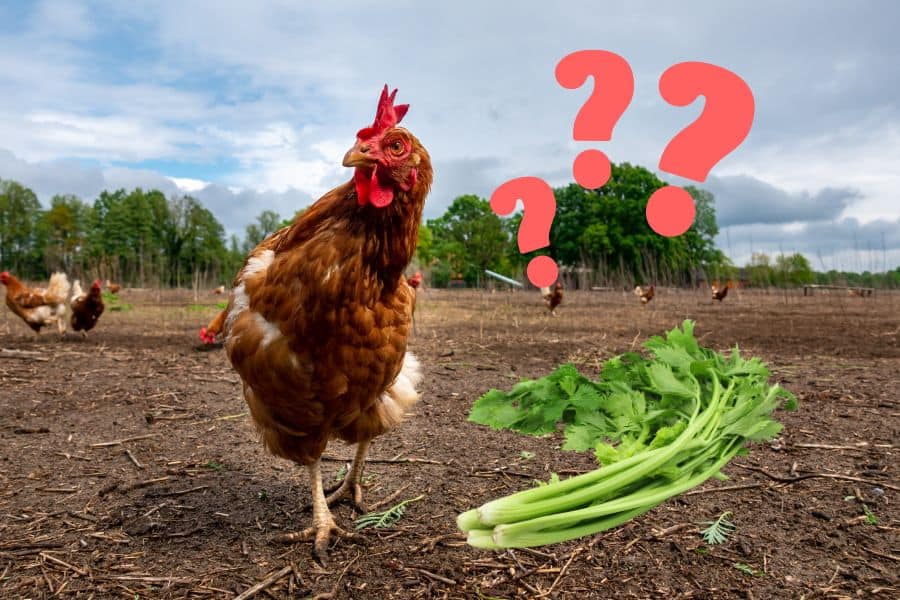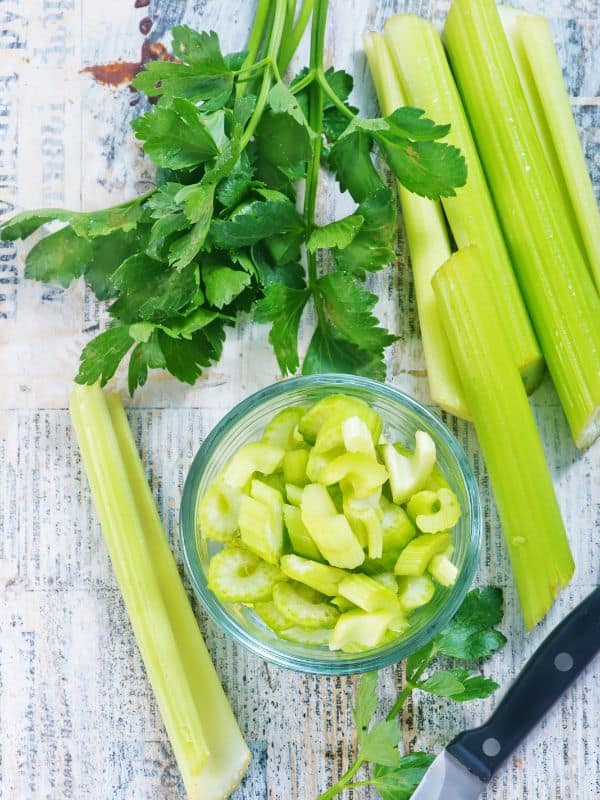Feeding your chickens can be exciting for many reasons.
As natural omnivores, your birds will happily accept anything that can go down their throats, from fruits to vegetables, insects, and seeds.
But celery is one such leafy vegetable that draws endless debates amongst chicken lovers.
Can chickens have celery? Do they need celery? If so, what amount of celery is good for their health?

This guide is for you if you constantly ponder these and more questions.
Below, we break down everything you need to know about chicken and celery, including its nutritional element, safety, and benefits.
What is Celery?
Celery is a low-calorie, leafy green vegetable of the Apiaceae family that provides water, fiber, and antioxidants.
The marshland plant has crunchy stalks that offer several benefits to human beings and chickens.
Celery is popular in many European, Asian, African, and North American cuisines, where it has been used in salads, sauces, and soups.
Celery provides a range of essential nutrients, including vitamins A, C, and K, fiber, water, and minerals such as potassium, calcium, and phosphorus.
Can Chickens Have Celery?
Yes! Chickens eat celery.
As natural omnivores, chickens have a wide menu that includes petiole vegetables such as celery.
However, there are a few guidelines to beware of when feeding celery to your chicken.
Let’s discuss that below.
Feeding Celery to Chickens: What Should You Know?
Chickens are omnivores and happily gobble up any food you introduce to their coop.
But too much of anything is poisonous.
While your birds will happily feed on celery, be careful not to provide it in excess, which could negatively impact their lives.
Celery is best served as an occasional treat to supplement the primary food and limit the negative impact on your birds.
Which Part of Celery Should You Feed Your Chicken?
Thankfully, chickens aren’t selective when it comes to eating fresh vegetables like celery.
While the crunchy stalks are the primary source of nutrients, you can also feed your chickens the leaves, which are just as nourishing.
Some birds will also eat the roots.
How To Feed Celery to Chickens?
Here are a few guidelines to keep in mind before introducing your chickens to celery;
- Rinsing the Vegetable
Start by rinsing and inspecting the vegetable before feeding it to your chicken. Of course, feeding your chicken is a lot like nursing a toddler. And you don’t want to expose them to rotten or moldy vegetables. Also, remove the bugs that could negatively impact your birds.
- Chopping It Up
Celery is a stringy vegetable thanks to its high fiber content. And your chickens won’t enjoy it if you provide bulky pieces they’ll struggle to pick up and eat.
Provide small pieces to avoid frustrating your birds and prevent digestive tract issues.
- Confirming the Expiration Date
If you’re buying your celery from a local market, checking the expiration date is paramount. You don’t want to harm your birds by giving them moldy or rotten veggies that have stayed past their time.
- Moderate Feeding
Resist the temptation to feed your chickens more celery than they need, no matter how much they love it.
It is perfect to offer it as a treat, maintaining it at about 10% of their diet.
- Adding Some Grit
Chickens can’t grind celery because they don’t have teeth. So, throw in some grit to reduce the particle size and help with grinding and digestion.
- Mixing Celery with Other Foods
Don’t be surprised if your birds don’t enjoy celery the first time. Chicken lovers will know how picky these little friends can be from time to time.
When that happens, you will need creative ways to make the vegetable more appealing to them, such as mixing it with other foods.
Top 3 Benefits of Celery to Your Chicken
Below are the top 3 benefits of celery to your birds;
1. Strengthens Immunity
Celery is a rich source of vitamins C, K, and A. It also provides several nutrients, including zinc, iron, potassium, calcium, magnesium, and manganese, which help strengthen the chickens’ immunity. The same nutrients maintain strong bones and support digestion, ensuring your birds remain healthy.
2. Supports the Gut and Digestion
Healthy living begins in the gut. And the high fiber content in celery supports gut health, aiding in proper digestion and preventing digestive tract issues.
If you introduce celery to your birds’ diet, you will be preventing common gastrointestinal issues. But still, don’t forget to supply celery in moderation because too much fiber intake won’t benefit the chickens significantly.
3. Helps with Hydration
Celery comprises 95% water, making it a refreshing choice for hydration during the hot summer.
The high water content replenishes fluids, maintaining the electrolyte balance while keeping your chickens healthy throughout the hot months. This is even more important for your egg-laying birds, which are more susceptible to dehydration.
Picking the Right Celery for Your Chickens
Keep the following in mind when choosing good celery for your birds;
Check for Discoloration
Fresh celery will have green leaves. Thus, if the vegetable is yellow or brown, it’s probably not the best option for your birds.
Discolored celery indicates expiry and could harm your chickens if ignored.
Growing Method
How is it produced?
Organically grown celery is better than those produced with chemicals. They are also more appealing and taste better, offering the best nutrients to your chickens.
A handy tip here would be to grow your celery at home. But if you can’t manage that, at least buy your vegetables from a trusted farmer.
Storage Method
How will you store your celery?
We’ve mentioned that celery is best served as an occasional treat, so you will need the perfect storage space once you have them at home.
Your chickens will likely only eat part of the bunch at a time.
While celery can stay for up to a month with proper storage, keeping them as fresh as possible is important.
Ensure they aren’t frozen or expired by refrigerating them home after washing and drying the stalks.
Which Celery Alternatives Do You Have?
Celery might be a rich source of vitamins and other nutrients, but it is not the only nutritious leafy vegetable for your birds. You have the following alternatives if your chickens don’t like celery;
What If My Chickens Don’t Eat Celery?
While celery is 100% safe for your birds, they may not eat it for whatever reason. Don’t panic when that happens.
Chickens are just like humans, with preferences, likes, and dislikes.
Also, celery doesn’t have the best taste to make every chicken love it.
So, if your birds don’t enjoy it, that’s perfectly fine.
Try to introduce it slowly to the diet and make it more appealing.
Read More:
Final Thoughts
Indeed, chickens can have celery.
But you must make it attractive to them.
While the bland taste may not appeal to your birds, providing bulky pieces will only worsen the situation, making it difficult for them to pick up and eat the vegetables.
Considering its multiple health benefits, you will want to make celery an important part of your chickens’ diet.
Make sure you pick fresh vegetables, chop them into the right pieces, and provide them in moderation. Oh! And don’t forget to introduce some grit to help with proper digestion.
Happy chicken keeping as you introduce them to the highly nutritious celery.

